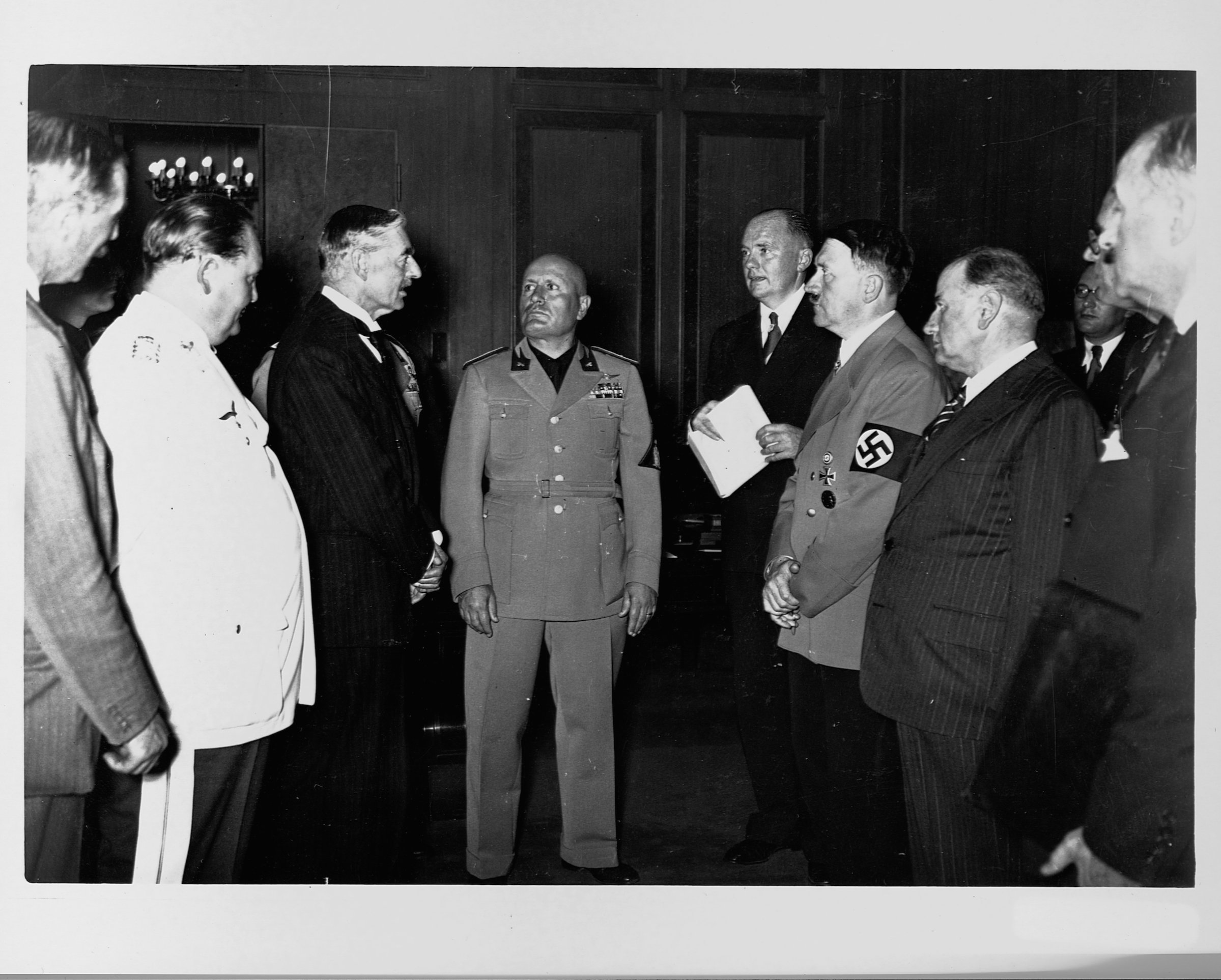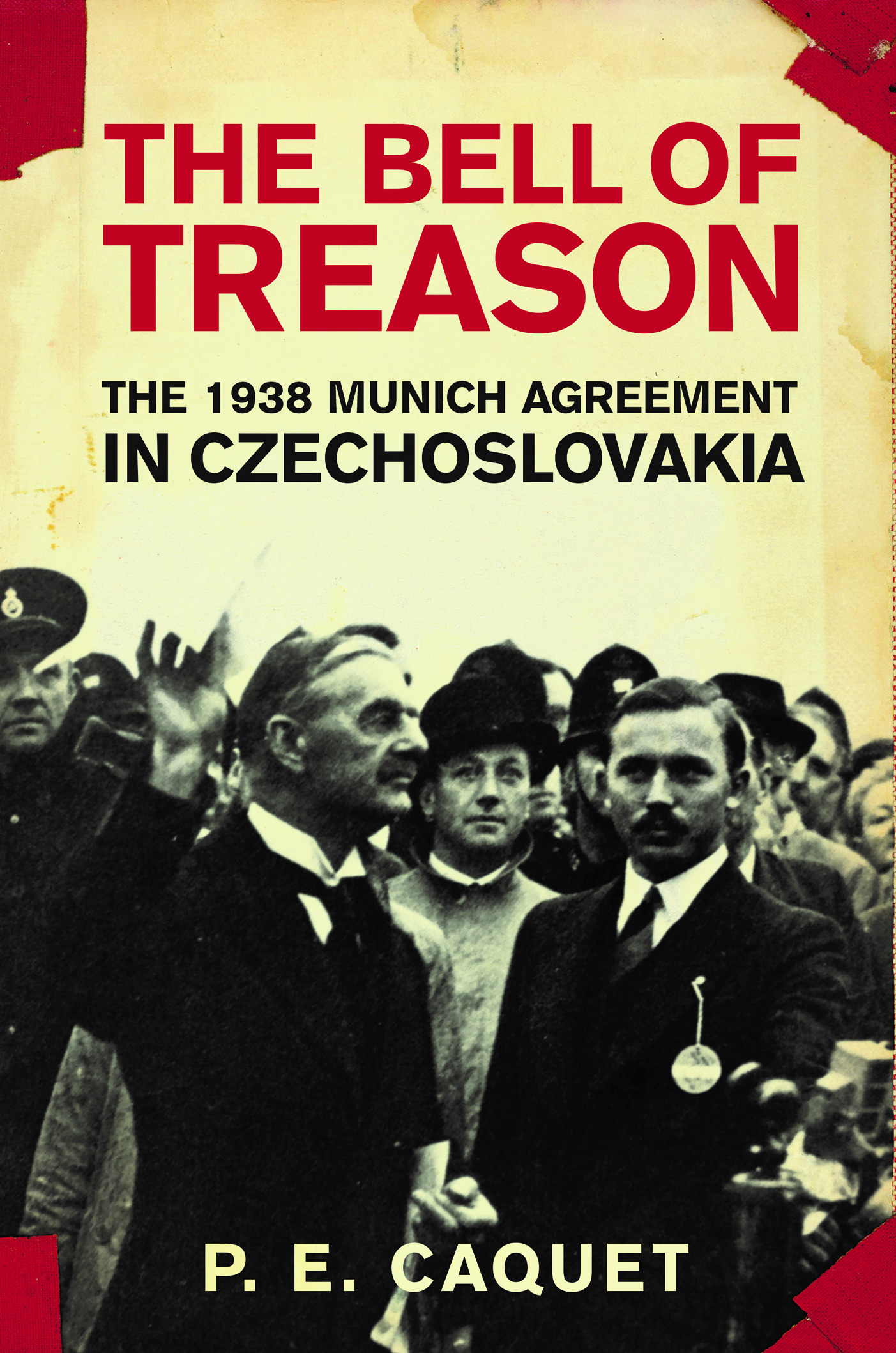
Apologists of appeasement have argued that public opinion, whether on the British or the French side, was unprepared for war in 1938. This, as recent studies have shown, is debatable. British Prime Minister Neville Chamberlain received 20,000 letters and telegrams thanking him for averting war at Munich. The delirious scenes of welcome to Chamberlain and French Prime Minister Édouard Daladier on their return bear witness to the preparedness of many to salute a peace that sacrificed Czechoslovakia. Yet sheer relief at not having to fight or endure the dangers and hardships of war, especially after it had appeared so close, must account for much of this enthusiasm.
When the statesmen returned, the full details of the Munich Agreement—with which they allowed Germany to take the territory of the Sudetenland from Czechoslovakia, in a failed attempt to avoid what would become World War II—were not yet known, and it looked as though they had extracted actual concessions out of Hitler and at least saved face. That public support for Chamberlain after Munich owed as much to a relief reflex as to confidence in his policies is borne out by the comprehensive analysis by historian Daniel Hucker, whose conclusion is that “In many ways the ‘turning point’ for public opinion was not the Prague coup [the German invasion of March 1939], but the Munich Agreement itself.”
In 1938, opinion polls were taking their first baby steps. A British poll taken in the Munich conference’s immediate aftermath had 57% satisfied with Chamberlain, 33% dissatisfied and 10% undecided. When questioned about rearmament, however, or about future dealings with Nazi Germany, respondents were more bellicose, suggesting far more doubt about the justice or durability of the peace: 72% favored increased defense spending. Nor was 57% perhaps such a large majority once account is taken of the propaganda value of Chamberlain’s shuttle diplomacy and its ostensibly triumphant conclusion. An admittedly less statistically robust survey by the so-called Mass-Observation system gave 40% as “indignantly anti-Chamberlain” and only 22% in support as of Sept. 20.
A French opinion poll carried out in early October 1938 had 57% in favor of Daladier’s policy, 37% against and 6% undecided, very similar to Britain’s post-Munich numbers. But, likewise, 70% also replied that any further demands from Hitler must be resisted. The shadow of the Great War meant that panic took over in September, in the immediate run-up to Munich. During the crisis, however, French opinion was only fluid.
In both countries, pro- and anti-appeasers straddled the left–right divide. As in Britain, an incomplete understanding of Czechoslovakia’s national and strategic issues jostled with sympathy for an ally that was also an underdog, dislike of Nazism and the urge to stave war off—though in Britain negative opinions of the Versailles settlement also helped make appeasement look more respectable.
Another factor specific to Britain was that the Dominions, whose participation was regarded as essential in any future war, were highly reluctant to fight on behalf of Czechoslovakia. South Africa and Canada were keen to avoid any sort of European commitment. The New Zealand high commissioner in London was more hawkish, but his Australian counterpart emerged as supportive of the Anschluss and of ceding the Sudetenland. When Chamberlain returned from Berchtesgaden, “applause was heard from every corner of the commonwealth.” Yet domestically at least there was room for a more decisive leadership to mold an ambivalent opinion in favor of resistance to Hitler. The historian Yvon Lacaze writes of France: “A preference for slavery over war did not form the basis of public opinion. […] To hold French pacifism as an insurmountable obstacle to a firm attitude is to indulge in political rhetoric; the desire for peace, a normal aspiration of the masses, must not be confused with the defeatism of a few.” The same could have been said of Britain.
Get your history fix in one place: sign up for the weekly TIME History newsletter
It is to this international opinion that the Czechoslovaks frantically tried to appeal. In the last days of June, the PEN Club, a London-based writers’ association founded for the defense of free speech and mutual understanding across cultures, had held its annual congress in Prague. At this conference, the French novelist Jules Romains, the club president, felt it necessary to denounce complaints that the PEN Club was engaging in politics, labeling these complaints “naïve” and “hypocritical.” At the time, this had given rise to controversy, particularly with Romains’s predecessor as president, H. G. Wells, who was a committed pacifist (it was Wells who had coined the phrase “the war to end war” in 1914).
This made it all the more noteworthy, and perhaps poignant, that Wells now joined, in September and as war actually threatened, the ranks of literary personalities to speak out publicly in favor of Czechoslovakia. Bertolt Brecht sent a telegram to the president of the republic with the single sentence: “Fight, and those who dither will join the fight with you.” The British writers, whose most prominent names included H. G. Wells, W. H. Auden, Eric Ambler and A. A. Milne, offered that “It is not just Czechoslovakia, but democracy, peace, and civilisation throughout the world that are being attacked. These are the very basis for culture. That is why we writers feel justified in publishing this appeal for the defense of these values and their endangered representatives, and for the defense of the Czechoslovak people.” Thomas Mann took to both pen and pulpit in defense of his surrogate homeland, proclaiming his pride at being a Czechoslovak citizen and praising the republic’s achievements. He attacked a “Europe ready for slavery,” writing that “the Czechoslovak people is ready to take up a fight for liberty that transcends its own fate.” The Nobel laureate addressed an enthusiastic public in New York’s Madison Square Garden on Sept. 26: “It is too late for the British government to save the peace. They have lost too many opportunities. Now it is the peoples’ turn. Hitler must fall! That alone can preserve the peace!”
Between Chamberlain’s Berchtesgaden and Godesberg trips, both the leaders of the British Liberal Party, Sir Archibald Sinclair, and the Labour Party, Clement Attlee, came out publicly against any further appeasement of Hitler. Churchill issued his own simultaneous warning. “The partition of Czechoslovakia under pressure from England and France amounts to the complete surrender of the Western democracies to the Nazi threat of force,” he said. “It is not Czechoslovakia alone which is menaced, but also the freedom and the democracy of all nations.”
A week later, as the war scare was peaking, Chamberlain would speak on the radio and pronounce, as part of a brief harangue taking stock of the situation, the lines that would become notorious: “How horrible, fantastic, incredible it is that we should be digging trenches and trying on gas-masks here because of a quarrel in a far-away country between people of whom we know nothing.”
In fairness, Chamberlain also said that he understood the reasons why the Czechoslovak government had turned down Hitler’s last demands and spoke of the sympathy of the British people for “a small nation confronted by a big and powerful neighbour.” In Czechoslovakia, nevertheless, the contempt for these people of whom Chamberlain claimed to know so little struck home, as well as disbelief that the British premier would still not acknowledge what was at stake. Under the headline “A small nation?” the daily Národní politika attempted a reply:
On a moral, cultural, economic, or social level we are as well placed as the world’s great democracies, and we are proud of it. The defense of our state should accordingly be worthy of this moral and cultural level, this all the more that we form a dam against the violence and lawlessness that is threatening the world’s moral and legal order. The size of a country is not decisive: on the scales are truth and justice, ideals of which the British prime minister should think first and foremost, if he is to speak of the democratic duties of his renowned country.

Excerpted from The Bell of Treason: The 1938 Munich Agreement in Czechoslovakia, by P. E. Caquet, published by Other Press.
More Must-Reads from TIME
- Why Biden Dropped Out
- Ukraine’s Plan to Survive Trump
- The Rise of a New Kind of Parenting Guru
- The Chaos and Commotion of the RNC in Photos
- Why We All Have a Stake in Twisters’ Success
- 8 Eating Habits That Actually Improve Your Sleep
- Welcome to the Noah Lyles Olympics
- Get Our Paris Olympics Newsletter in Your Inbox
Contact us at letters@time.com